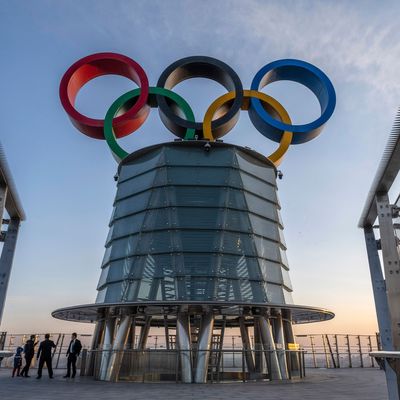
Though COVID-19 cases are surging around the world, Beijing’s 2022 Winter Olympics will start Friday. Like the 2020 Summer Olympics in Tokyo, some Olympic Committee members have expressed concern about hosting a global event amid a global pandemic. The lead-up to this year’s games have been overshadowed by protests, diplomatic boycotts, and warnings from Beijing’s Olympic chair for athletes to “be responsible” when speaking about controversial issues (e.g., the diplomatic boycott). Regardless, officials appear hell-bent yet again on continuing with their regularly scheduled programming. Cue “Bugler’s Dream,” I guess.
Didn’t the Olympics just happen?
Yes, these games will begin less than six months after the previous Olympic Games ended. Tokyo’s 2020 Summer Olympics were postponed for a year because of the pandemic. (They were still called the 2020 Olympics despite being hosted in 2021 — mostly, it seems, because they’d already lit the torch. I don’t get it, either.) Of course, the pandemic was still happening when the rescheduled events took place between July and August of last year. In total, 294 of the more than 11,000 athletes tested positive for COVID during the games.
But … Omicron?
As outlined in its playbook, the International Olympics Committee will require athletes to be fully vaccinated at least 14 days prior to arriving in Beijing. The rule allows for exemptions based on medical need, but those who receive them will need to quarantine for 21 days once they arrive in Beijing. This exemption has been extended to some Russian figure skaters who are under 18, though Russia appears to have approved a COVID vaccine for minors ages 12 to 17 late last year. Underage athletes are also exempt from the 21-day quarantine. Some countries, including the United States, have mandated vaccinations for its competitors as well as staff members. The IOC is not requiring athletes to receive a booster shot, though it “strongly” suggests it.
Like the 2020 Olympics, the 2022 Winter Olympics will continue to have COVID-testing guidelines in place. Regardless of their vaccination status, all athletes will be tested for COVID daily throughout the duration of the Olympic Games. Athletes will be required to mask at all times except when competing. Those who medal will be allowed to remove their masks on the podium for a photo.
How many athletes have tested positive for COVID?
As of February 1, 67 athletes and Olympic officials across all competing countries have tested positive since arriving in China. While it’s not clear how many of those athletes are from Team USA, the U.S. bobsled and skeleton team has had multiple athletes test positive, per Yahoo Sports, including three-time Olympic bobsled medalist Elana Meyers. Athletes who test positive may be still be able to compete in this year’s events if they have two negative PCR tests at least 24 hours apart and are asymptomatic.
What’s this about a boycott?
In December, the U.S. announced a diplomatic boycott of Beijing’s Winter Olympics, with Australia, Canada, and Britain following suit. Per Jen Psaki, the White House press secretary, the decision was spurred by the host country’s “ongoing genocide and crimes against humanity in Xinjiang and other human rights abuses.” Over the past several years, the Chinese government has been targeting Uyghurs as well as other predominantly Muslim ethnic minorities with tactics including mass detention and forced sterilization. Further calls for an Olympic Games boycott came after the disappearance of Peng Shuai, one of China’s top tennis players, who had accused a former senior government official of sexual assault. The IOC has maintained that she is “safe and well,” though some are still concerned about Peng’s well-being.
In addition to the aforementioned warning from Beijing Olympic officials, there have been reports of Chinese authorities detaining activists and journalists and censoring their social-media accounts. On January 13, Hu Jia, a prominent Chinese civil-rights activist, said police were keeping him confined to his apartment after he tweeted about how authorities have handled criticism about the Olympics. Per the New York Times, he’s since been visited by police four times in a little over a week.
Despite the diplomatic boycott, athletes from the U.S. and other participating countries will still compete, though their government officials will not be attending. Given the IOC’s spectator guidelines, the impact may not be quite as dramatic as in previous Olympics. Speaking of which …
Will the Olympics have spectators?
You can expect another eerie opening ceremony as spectators will be limited to residents of mainland China. Those who attend the events will need to meet the IOC’s COVID safety requirements, though the specific details for spectators are unclear.
Which sports does this one have?
It’s time to care about luging once again! In case you need a refresher, Winter Games events include skiing, snowboarding, figure skating, hockey, curling, and something called skeleton. These Olympics will feature seven new events: women’s monobob in bobsled, mixed-team aerials in freestyle skiing, men’s big air and women’s big air in freestyle skiing, mixed-team relay in short-track speedskating, mixed-team event in ski jumping, and mixed-team snowboard cross in snowboarding. If nothing else, the Winter Olympics have the best-named sports.
How can I watch the Olympics?
As usual, NBC will be airing all things Olympics. The games will also be available to stream on services such as NBC’s Peacock, YouTube TV, and Hulu+ with a live-TV subscription. The opening ceremony will take place early Friday morning, and the closing ceremony will be Sunday, February 20. Don’t forget there’s a 13-hour time difference between New York and Beijing! This does mean some events, like the opening ceremony, will air at ungodly hours (and will re-air during prime time). You can see the full schedule on the Olympics website.
This post has been updated.




